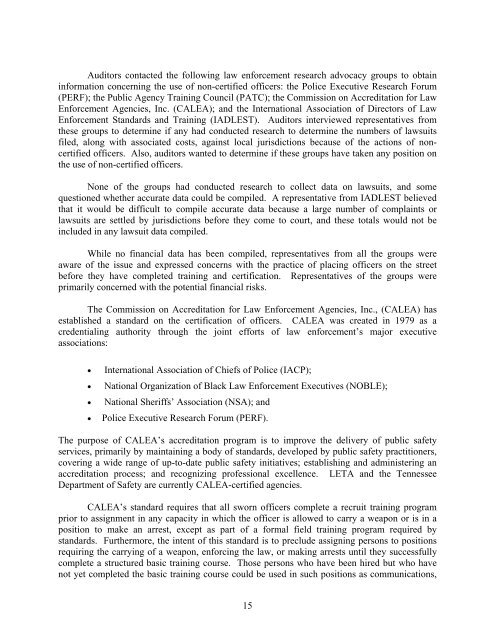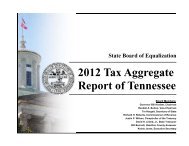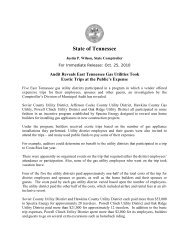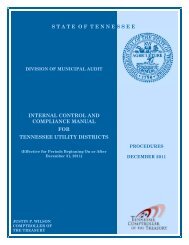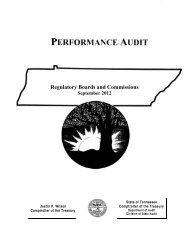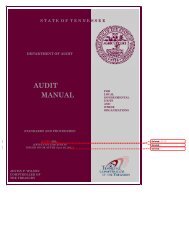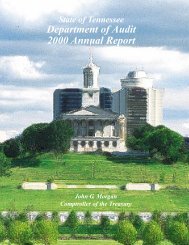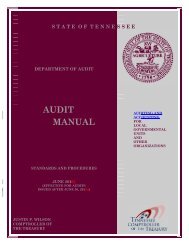Peace Officer Standards and Training Commission and Law ...
Peace Officer Standards and Training Commission and Law ...
Peace Officer Standards and Training Commission and Law ...
- No tags were found...
Create successful ePaper yourself
Turn your PDF publications into a flip-book with our unique Google optimized e-Paper software.
Auditors contacted the following law enforcement research advocacy groups to obtaininformation concerning the use of non-certified officers: the Police Executive Research Forum(PERF); the Public Agency <strong>Training</strong> Council (PATC); the <strong>Commission</strong> on Accreditation for <strong>Law</strong>Enforcement Agencies, Inc. (CALEA); <strong>and</strong> the International Association of Directors of <strong>Law</strong>Enforcement <strong>St<strong>and</strong>ards</strong> <strong>and</strong> <strong>Training</strong> (IADLEST). Auditors interviewed representatives fromthese groups to determine if any had conducted research to determine the numbers of lawsuitsfiled, along with associated costs, against local jurisdictions because of the actions of noncertifiedofficers. Also, auditors wanted to determine if these groups have taken any position onthe use of non-certified officers.None of the groups had conducted research to collect data on lawsuits, <strong>and</strong> somequestioned whether accurate data could be compiled. A representative from IADLEST believedthat it would be difficult to compile accurate data because a large number of complaints orlawsuits are settled by jurisdictions before they come to court, <strong>and</strong> these totals would not beincluded in any lawsuit data compiled.While no financial data has been compiled, representatives from all the groups wereaware of the issue <strong>and</strong> expressed concerns with the practice of placing officers on the streetbefore they have completed training <strong>and</strong> certification. Representatives of the groups wereprimarily concerned with the potential financial risks.The <strong>Commission</strong> on Accreditation for <strong>Law</strong> Enforcement Agencies, Inc., (CALEA) hasestablished a st<strong>and</strong>ard on the certification of officers. CALEA was created in 1979 as acredentialing authority through the joint efforts of law enforcement’s major executiveassociations:• International Association of Chiefs of Police (IACP);• National Organization of Black <strong>Law</strong> Enforcement Executives (NOBLE);• National Sheriffs’ Association (NSA); <strong>and</strong>• Police Executive Research Forum (PERF).The purpose of CALEA’s accreditation program is to improve the delivery of public safetyservices, primarily by maintaining a body of st<strong>and</strong>ards, developed by public safety practitioners,covering a wide range of up-to-date public safety initiatives; establishing <strong>and</strong> administering anaccreditation process; <strong>and</strong> recognizing professional excellence. LETA <strong>and</strong> the TennesseeDepartment of Safety are currently CALEA-certified agencies.CALEA’s st<strong>and</strong>ard requires that all sworn officers complete a recruit training programprior to assignment in any capacity in which the officer is allowed to carry a weapon or is in aposition to make an arrest, except as part of a formal field training program required byst<strong>and</strong>ards. Furthermore, the intent of this st<strong>and</strong>ard is to preclude assigning persons to positionsrequiring the carrying of a weapon, enforcing the law, or making arrests until they successfullycomplete a structured basic training course. Those persons who have been hired but who havenot yet completed the basic training course could be used in such positions as communications,15


